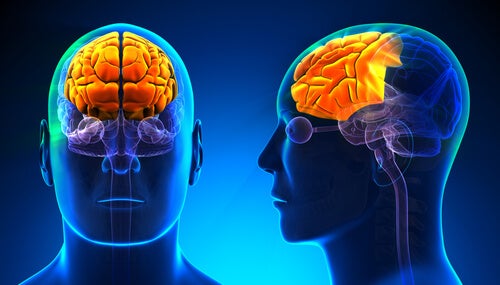The Neurobiology of Alcoholism

Just as there are neuroanatomic and neurofunctional frameworks to explain human behavior, we also have the neurobiology of alcoholism. In this article, we’ll explain what happens in the brain of a person with alcohol addiction.
Alcohol is the most widely-used legal drug. It has a great social and economic burden in society and is capable of generating physical and psychological dependence. According to the WHO, alcoholism affects 140 million people in the world and is the fifth most common cause of premature death.
There are many illnesses and conditions associated with alcohol consumption, from tuberculosis to HIV and infections. So, what happens in the brain after alcohol intake and, especially, when there’s a problem of dependence? That’s where the neurobiology of alcoholism comes in.
The neurobiology of alcoholism explained
The cause and development of alcoholism involve a complex interaction between biological, psychological, social, and environmental factors.
The most reliable predictors of a person becoming dependent are genetic or hereditary factors. The congenital disposition of an individual to suffering alcoholism accounts for up to 60% of alcoholism cases.

From a biochemical point of view, the risk of alcohol dependence has a link to variations in genes that encode protein that are made up of two enzymes in particular: alcohol dehydrogenase and aldehyde dehydrogenase.
But in addition to the possible hereditary origins, scientists suggest other potential neurobiological causes, such as the reduction in the level of the MAO-A enzyme (mono-amino-oxidase type A) that some subjects experience after experiencing traumatic events.
Low levels of MAO-A have been linked to increases in antisocial behavior, which in turn constitutes a risk factor for alcoholism.
Of course, there are other possible explanations about the cause of more normal types of behavioral alcoholism. These have to do with learning experiences and personality traits. The effects are the same, but on a different level to the neurobiological one. At the same time, though, there is a direct link.
Hormones and neurotransmitters in the neurobiology of alcoholism
Scientists have shown that, either directly or indirectly, alcohol can interact with a wide range of neurotransmitters in the nervous system. This interaction occurs due to the liposoluble nature of ethanol, which allows it to cross the blood-brain barrier (BBB) and thus reach the brain.
The neurotransmitters and hormones susceptible to interaction with ethyl alcohol are the following:
- GABA
- Glutamate
- Endogenous opioids
- Dopamine
- Adrenaline and norepinephrine
- Acetylcholine
- Serotonin
- Cannabinoids
- Corticotropin-releasing factor (CLF)
- Neuropeptide Y

Alcohol dependence is a deficit in the physiological regulation capacity of our endogenous motivation and reward systems. Several brain structures are responsible for these systems that impact human behavior. Systems such as the limbic system, the amygdala, the hippocampus, the caudate nucleus, the nuccleus accumbens, and the frontal lobe.
A dysfunction in the aforementioned systems could be linked to alcohol dependence, alcohol intoxication, or withdrawal symptoms.
The effects of alcoholism
Alcohol consumption produces a disinhibitory effect and a central nervous system depressant effect. The former is characterized by a brain structure blockage and alteration, as well as the processes that are related to thinking, reflection, or ethical values, among others. In addition, it promotes impulsiveness and the uncontrolled exhibition of certain emotions.
In this way, some very relevant cognitive functions are more or less permanently affected. These include the executive functions (cognitive processes related to behavior) of the frontal lobes, memory problems, visuospatial ability deficit, and motor and oculomotor control problems.
The involvement of executive functions by alcohol consumption is usually manifested in the form of impulsivity, dulled emotions, poor judgment, concentration deficits, disinhibition and loss of motivation.
The disinhibitory effect
The disinhibitory effect of alcohol allows the person to behave in a way they wouldn’t if they were sober. Alcohol can provide a temporary sensation of freedom, empathy, and increased emotions.
Normally, substantial and prolonged alcohol consumption is required in order for the brain to develop a dependence.
In general, the development of alcoholism can be explained by the positive reinforcement effects that alcohol consumption produces in the brain. The intake of this substance activates the brain’s reward system and generates pleasant sensations that lead the brain to want to consume more.
There are many help and support resources available for alcoholism sufferers. Consulting a doctor is the best first step to begin the process of alcohol detoxification.
As you can see, the neurobiology of alcoholism explains the how and when of the behavior behind alcohol abuse. The “why” is a lot more difficult to explain. However, we must hope that the many existing approaches can be of great help to those who suffer from this terrible addiction.
Just as there are neuroanatomic and neurofunctional frameworks to explain human behavior, we also have the neurobiology of alcoholism. In this article, we’ll explain what happens in the brain of a person with alcohol addiction.
Alcohol is the most widely-used legal drug. It has a great social and economic burden in society and is capable of generating physical and psychological dependence. According to the WHO, alcoholism affects 140 million people in the world and is the fifth most common cause of premature death.
There are many illnesses and conditions associated with alcohol consumption, from tuberculosis to HIV and infections. So, what happens in the brain after alcohol intake and, especially, when there’s a problem of dependence? That’s where the neurobiology of alcoholism comes in.
The neurobiology of alcoholism explained
The cause and development of alcoholism involve a complex interaction between biological, psychological, social, and environmental factors.
The most reliable predictors of a person becoming dependent are genetic or hereditary factors. The congenital disposition of an individual to suffering alcoholism accounts for up to 60% of alcoholism cases.

From a biochemical point of view, the risk of alcohol dependence has a link to variations in genes that encode protein that are made up of two enzymes in particular: alcohol dehydrogenase and aldehyde dehydrogenase.
But in addition to the possible hereditary origins, scientists suggest other potential neurobiological causes, such as the reduction in the level of the MAO-A enzyme (mono-amino-oxidase type A) that some subjects experience after experiencing traumatic events.
Low levels of MAO-A have been linked to increases in antisocial behavior, which in turn constitutes a risk factor for alcoholism.
Of course, there are other possible explanations about the cause of more normal types of behavioral alcoholism. These have to do with learning experiences and personality traits. The effects are the same, but on a different level to the neurobiological one. At the same time, though, there is a direct link.
Hormones and neurotransmitters in the neurobiology of alcoholism
Scientists have shown that, either directly or indirectly, alcohol can interact with a wide range of neurotransmitters in the nervous system. This interaction occurs due to the liposoluble nature of ethanol, which allows it to cross the blood-brain barrier (BBB) and thus reach the brain.
The neurotransmitters and hormones susceptible to interaction with ethyl alcohol are the following:
- GABA
- Glutamate
- Endogenous opioids
- Dopamine
- Adrenaline and norepinephrine
- Acetylcholine
- Serotonin
- Cannabinoids
- Corticotropin-releasing factor (CLF)
- Neuropeptide Y

Alcohol dependence is a deficit in the physiological regulation capacity of our endogenous motivation and reward systems. Several brain structures are responsible for these systems that impact human behavior. Systems such as the limbic system, the amygdala, the hippocampus, the caudate nucleus, the nuccleus accumbens, and the frontal lobe.
A dysfunction in the aforementioned systems could be linked to alcohol dependence, alcohol intoxication, or withdrawal symptoms.
The effects of alcoholism
Alcohol consumption produces a disinhibitory effect and a central nervous system depressant effect. The former is characterized by a brain structure blockage and alteration, as well as the processes that are related to thinking, reflection, or ethical values, among others. In addition, it promotes impulsiveness and the uncontrolled exhibition of certain emotions.
In this way, some very relevant cognitive functions are more or less permanently affected. These include the executive functions (cognitive processes related to behavior) of the frontal lobes, memory problems, visuospatial ability deficit, and motor and oculomotor control problems.
The involvement of executive functions by alcohol consumption is usually manifested in the form of impulsivity, dulled emotions, poor judgment, concentration deficits, disinhibition and loss of motivation.
The disinhibitory effect
The disinhibitory effect of alcohol allows the person to behave in a way they wouldn’t if they were sober. Alcohol can provide a temporary sensation of freedom, empathy, and increased emotions.
Normally, substantial and prolonged alcohol consumption is required in order for the brain to develop a dependence.
In general, the development of alcoholism can be explained by the positive reinforcement effects that alcohol consumption produces in the brain. The intake of this substance activates the brain’s reward system and generates pleasant sensations that lead the brain to want to consume more.
There are many help and support resources available for alcoholism sufferers. Consulting a doctor is the best first step to begin the process of alcohol detoxification.
As you can see, the neurobiology of alcoholism explains the how and when of the behavior behind alcohol abuse. The “why” is a lot more difficult to explain. However, we must hope that the many existing approaches can be of great help to those who suffer from this terrible addiction.
All cited sources were thoroughly reviewed by our team to ensure their quality, reliability, currency, and validity. The bibliography of this article was considered reliable and of academic or scientific accuracy.
- Herrero Carcedo, C. (2018). Alcoholismo y epigenética. Publicación independiente.
- Rey-Buitrago, M. (2915). Genética molecular del alcoholismo. Revista de la Facultad de Medicina de la Universidad Nacional de Colombia, 63, 483-94.
This text is provided for informational purposes only and does not replace consultation with a professional. If in doubt, consult your specialist.







